Error message
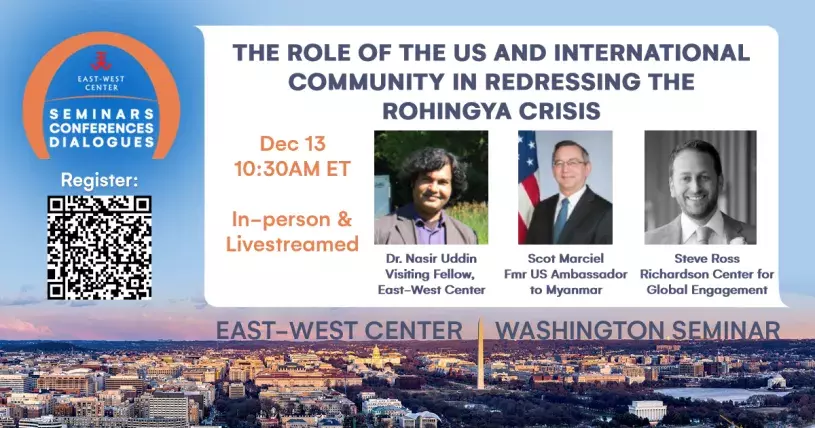
OFFICE/DEPARTMENT
The East-West Center in Washington held an
Indo-Pacific Democratic Values and Human Rights Series Seminar:
The Role of the US and the International Community in Redressing the Rohingya Crisis
A Conversation With:
Dr. Nasir Uddin
Professor of Anthropology, University of Chittagong
Visiting Fellow, The East-West Center in Washington
Amb. Scot Marciel
Fellow, Shorenstein Asia-Pacific Research Center, Stanford University
Former U.S. Ambassador to Myanmar
Steve Ross
Senior Advisor and Program Director
Richardson Center for Global Engagement
Dr. Satu P. Limaye (Moderator)
Vice President, East-West Center &
Director, Research Program and East-West Center in Washington
The Rohingya are known as the world’s most persecuted minority and continue to be labeled a ‘crisis’ by Bangladesh, Burma, the media, and the international community. The Rohingya received even more attention after the Burma security forces launched a genocidal campaign in August 2017 against the ARSA (Arakan Rohingya Salvation Army) that killed 10,000 civilian Rohingyas, devastated 400 villages, and forced as many as 740,000 Rohingya to take refuge in Bangladesh. As a result, Bangladesh is now home to about 1.3 million Rohingya refugees, and their massive presence has created serious socioeconomic and demographic pressure on the host society. In this seminar, Dr. Nasir Uddin presented his research on the roles that the United States and the international community play in addressing this issue and discuss how different policy frameworks and diplomatic strategies could be used to alleviate the Rohingya crisis.
SPEAKER BIOGRAPHIES
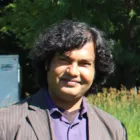
Professor Nasir Uddin (PhD) is a cultural anthropologist based in Bangladesh and a Faculty of Anthropology at the University of Chittagong. Uddin carried out research at the University of Oxford (UK), School of Oriental and African Studies (SOAS) at London University (UK), the London School of Economics (LSE) at London University (UK), Heidelberg University (Germany), VU University Amsterdam (the Netherlands), Ruhr-University Bochum (Germany), Delhi School of Economics at Delhi University (India), the University of Hull (UK), Kyoto University (Japan), and the University of Dhaka (Bangladesh). He has achieved a good number of prestigious awards and fellowships including the MEXT Scholarship (Japan), the British Academy Visiting Scholarship (UK), the Alexander von Humboldt Foundation Fellowship (Germany), a Visiting Scholarship at LSE (UK), a Visiting Fellowship at Oxford University (UK), and James Fellowship in Social Science with SSSHARC at the University of Sydney (Australia).
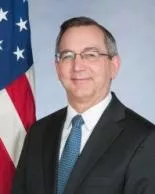
Amb. Scot Marciel is an Oksenberg-Rohlen Fellow at the Freeman Spogli Institute for International Studies, affiliated with the Walter H. Shorenstein Asia-Pacific Research Center. Previously, he was a 2020-22 Visiting Scholar and Visiting Practitioner Fellow on Southeast Asia at APARC. A retired diplomat, Mr. Marciel served as U.S. Ambassador to Myanmar from March 2016 through May 2020, leading a mission of 500 employees during the difficult Rohingya crisis and a challenging time for both Myanmar’s democratic transition and the United States-Myanmar relationship. Prior to serving in Myanmar, Ambassador Marciel served as Principal Deputy Assistant Secretary for East Asia and the Pacific at the State Department, where he oversaw U.S. relations with Southeast Asia.
From 2010 to 2013, Scot Marciel served as U.S. Ambassador to Indonesia, the world’s fourth most populous country. He led a mission of some 1000 employees, expanding business ties, launching a new U.S.-Indonesia partnership, and rebuilding U.S.-Indonesian military-military relations. Prior to that, he served concurrently as the first U.S. Ambassador for ASEAN Affairs and Deputy Assistant Secretary of State for Southeast Asia from 2007 to 2010.
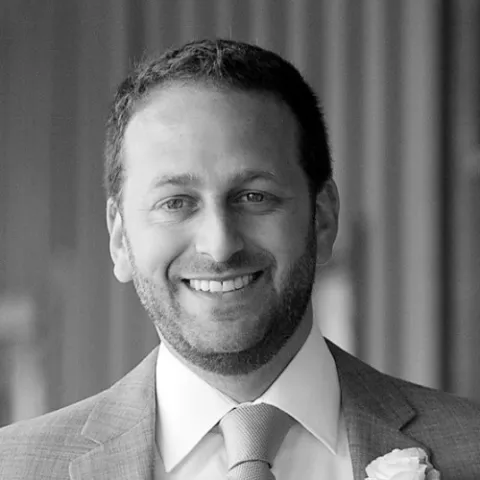
Steve Ross is a Senior Advisor and Program Director at the Richardson Center for Global Engagement, an organization founded by former US Ambassador to the UN and Governor Bill Richardson to promote global peace and dialogue. Steve has led the Center’s work on Myanmar, Bangladesh, and the Rohingya since January 2018. Prior to joining the Richardson Center and building a private consulting practice, Steve was based in Myanmar from October 2014 to February 2017, where he led a project to prevent and mitigate conflict in Rakhine State while concurrently supporting The Carter Center’s long-term observation mission of Myanmar’s 2015 elections. Working in a variety of roles with non-profit organizations, think tanks, the U.S. Department of State, and the United Nations, Steve has extensive experience addressing conflict, governance, and rule of law challenges across South and Southeast Asia, including nearly two years based in Phnom Penh, Cambodia. Steve holds a Master in Public Affairs from the School of Public and International Affairs at Princeton University and a Bachelor of Arts in Political Science and History from Tufts University.
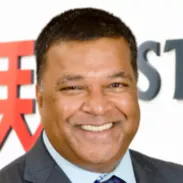
Satu P. Limaye is Vice President of the East-West Center and the Director of the East-West Center’s Research program and Washington office, where he created and now directs the Asia Matters for America initiative and is the founding editor of the Asia Pacific Bulletin. He is also a Senior Advisor at CNA Corp (Center for Naval Analyses). He is a graduate of Georgetown University and received his doctorate from Oxford University (Magdalen College) where he was a George C. Marshall Scholar. He publishes and speaks widely on Indo-Pacific regional issues and supports various U.S. government, foundation, fellowship, and professional organizations. Among his current affiliations are Center for New American Security (CNAS) Task Force on the U.S.-Philippines Alliance, United States Institute of Peace (USIP) Senior Study Group on the North Pacific, Project 2049 Study Group on the U.S.-Australia Alliance, Korea Economic Institute (KEI) Advisory Council, and Global Taiwan Institute-Taiwan Asia Exchange Foundation project. Recent publications include: Southeast Asia’s choices: Economic, political, and geopolitical integration face complications, India in East Asia: Focused on the Quad and Border Disputes with China, and Maintaining the Technology Edge: Strengthening US and Indo-Pacific Alliances to Counter Chinese Technology Acquisition (with Rose Tenyotkin).
The East-West Center in Washington held an
Indo-Pacific Democratic Values and Human Rights Series Seminar:
The Role of the US and the International Community in Redressing the Rohingya Crisis
A Conversation With:
Dr. Nasir Uddin
Professor of Anthropology, University of Chittagong
Visiting Fellow, The East-West Center in Washington
Amb. Scot Marciel
Fellow, Shorenstein Asia-Pacific Research Center, Stanford University
Former U.S. Ambassador to Myanmar
Steve Ross
Senior Advisor and Program Director
Richardson Center for Global Engagement
Dr. Satu P. Limaye (Moderator)
Vice President, East-West Center &
Director, Research Program and East-West Center in Washington
The Rohingya are known as the world’s most persecuted minority and continue to be labeled a ‘crisis’ by Bangladesh, Burma, the media, and the international community. The Rohingya received even more attention after the Burma security forces launched a genocidal campaign in August 2017 against the ARSA (Arakan Rohingya Salvation Army) that killed 10,000 civilian Rohingyas, devastated 400 villages, and forced as many as 740,000 Rohingya to take refuge in Bangladesh. As a result, Bangladesh is now home to about 1.3 million Rohingya refugees, and their massive presence has created serious socioeconomic and demographic pressure on the host society. In this seminar, Dr. Nasir Uddin presented his research on the roles that the United States and the international community play in addressing this issue and discuss how different policy frameworks and diplomatic strategies could be used to alleviate the Rohingya crisis.
SPEAKER BIOGRAPHIES

Professor Nasir Uddin (PhD) is a cultural anthropologist based in Bangladesh and a Faculty of Anthropology at the University of Chittagong. Uddin carried out research at the University of Oxford (UK), School of Oriental and African Studies (SOAS) at London University (UK), the London School of Economics (LSE) at London University (UK), Heidelberg University (Germany), VU University Amsterdam (the Netherlands), Ruhr-University Bochum (Germany), Delhi School of Economics at Delhi University (India), the University of Hull (UK), Kyoto University (Japan), and the University of Dhaka (Bangladesh). He has achieved a good number of prestigious awards and fellowships including the MEXT Scholarship (Japan), the British Academy Visiting Scholarship (UK), the Alexander von Humboldt Foundation Fellowship (Germany), a Visiting Scholarship at LSE (UK), a Visiting Fellowship at Oxford University (UK), and James Fellowship in Social Science with SSSHARC at the University of Sydney (Australia).

Amb. Scot Marciel is an Oksenberg-Rohlen Fellow at the Freeman Spogli Institute for International Studies, affiliated with the Walter H. Shorenstein Asia-Pacific Research Center. Previously, he was a 2020-22 Visiting Scholar and Visiting Practitioner Fellow on Southeast Asia at APARC. A retired diplomat, Mr. Marciel served as U.S. Ambassador to Myanmar from March 2016 through May 2020, leading a mission of 500 employees during the difficult Rohingya crisis and a challenging time for both Myanmar’s democratic transition and the United States-Myanmar relationship. Prior to serving in Myanmar, Ambassador Marciel served as Principal Deputy Assistant Secretary for East Asia and the Pacific at the State Department, where he oversaw U.S. relations with Southeast Asia.
From 2010 to 2013, Scot Marciel served as U.S. Ambassador to Indonesia, the world’s fourth most populous country. He led a mission of some 1000 employees, expanding business ties, launching a new U.S.-Indonesia partnership, and rebuilding U.S.-Indonesian military-military relations. Prior to that, he served concurrently as the first U.S. Ambassador for ASEAN Affairs and Deputy Assistant Secretary of State for Southeast Asia from 2007 to 2010.

Steve Ross is a Senior Advisor and Program Director at the Richardson Center for Global Engagement, an organization founded by former US Ambassador to the UN and Governor Bill Richardson to promote global peace and dialogue. Steve has led the Center’s work on Myanmar, Bangladesh, and the Rohingya since January 2018. Prior to joining the Richardson Center and building a private consulting practice, Steve was based in Myanmar from October 2014 to February 2017, where he led a project to prevent and mitigate conflict in Rakhine State while concurrently supporting The Carter Center’s long-term observation mission of Myanmar’s 2015 elections. Working in a variety of roles with non-profit organizations, think tanks, the U.S. Department of State, and the United Nations, Steve has extensive experience addressing conflict, governance, and rule of law challenges across South and Southeast Asia, including nearly two years based in Phnom Penh, Cambodia. Steve holds a Master in Public Affairs from the School of Public and International Affairs at Princeton University and a Bachelor of Arts in Political Science and History from Tufts University.

Satu P. Limaye is Vice President of the East-West Center and the Director of the East-West Center’s Research program and Washington office, where he created and now directs the Asia Matters for America initiative and is the founding editor of the Asia Pacific Bulletin. He is also a Senior Advisor at CNA Corp (Center for Naval Analyses). He is a graduate of Georgetown University and received his doctorate from Oxford University (Magdalen College) where he was a George C. Marshall Scholar. He publishes and speaks widely on Indo-Pacific regional issues and supports various U.S. government, foundation, fellowship, and professional organizations. Among his current affiliations are Center for New American Security (CNAS) Task Force on the U.S.-Philippines Alliance, United States Institute of Peace (USIP) Senior Study Group on the North Pacific, Project 2049 Study Group on the U.S.-Australia Alliance, Korea Economic Institute (KEI) Advisory Council, and Global Taiwan Institute-Taiwan Asia Exchange Foundation project. Recent publications include: Southeast Asia’s choices: Economic, political, and geopolitical integration face complications, India in East Asia: Focused on the Quad and Border Disputes with China, and Maintaining the Technology Edge: Strengthening US and Indo-Pacific Alliances to Counter Chinese Technology Acquisition (with Rose Tenyotkin).













